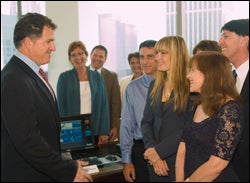Dell is looking for more
acquisitions and partnerships as part of its turnaround plans.
But that’s just one part of its plan to reignite growth, according to
Michael Dell, the CEO and founder who returned to the chief executive role
in January after Kevin Rollins resigned
in the face of slowing revenues, an internal accounting audit, and probes
over its accounting practices by regulators.
“I think we’ve made a little bit of progress but I think we have a long
way to go,” he said during a chat with members of the news media in New York
Tuesday. “We have set out to really transform the company and looked at the
company very broadly. There are things that are working well, and things
that aren’t working so well.”
 |
Dell meets with small business customers at an event in Times Square, New York. Source: Gene Hirschel |
As for what’s working, Dell discussed the investment the company has
made in customer service improvements, which has long been a gripe among
small business customers who complain they are left on hold too long, or
bounced around from one support person to another.
Service is a key part of Dell’s new “Vostro”
line of laptops, desktops, printers and other hardware focused solely on the
smallest of the small business IT needs.
As part of the launch, Dell announced that the products are backed by a
dedicated group of small business-trained technicians focused solely on
small-business technology issues. This is a big change in Dell’s approach,
which was always organized around product lines, rather than smaller
business sectors.
Take the Dell Network Assistant, which helps small business users
connect to a network, simplifies file sharing, printing and other peripherals,
and automates set up and some network troubleshooting features. If need be,
the tech support person can log into the customer’s network and troubleshoot issues that way.
The automated PC tune-up feature also assists customers with routine
troubleshooting issues, such as drive defragmentation. It also automates many
PC health functions for customers, such as updating security settings,
activating firewalls and enabling Windows updates.
It’s also providing Vostro customers with up to 10 gigabytes of data
backup for free for one year.
“We’re cutting the time to set up a computer nearly in half. We’re
reducing the number of steps to connect to a network to six,” compared to
the competition, Dell told customers gathered in New York for the Vostro
launch.
Another change in the line is that it’s coming without any extra
software, the so-called “bloatware” that Dell had become notorious for
loading onto many of its PCs.
Dell said the decision to leave off games and other extra software from
the Vostro line was a direct result of customer feedback sites it launched
back in February. The sites, IdeaStorm and StudioDell, were launched shortly after Dell returned to the CEO slot.
Within five days of the launch, over 1,200 submissions had been posted,
as well as more than 26,000 “votes” logged, in support of a “no extra
software” option.
As for which companies or areas it might be looking to acquire, Dell didn’t
elaborate. But some have already speculated that Dell might be keen to do
more with the hot market for cooling off datacenters.
For example, Dell recently announced a partnership with Emerson Network Power geared to improve datacenter cooling
efficiency and lower the costs of cooling off computers.
As
internetnews.com reported, the two companies will combine their sales
forces to promote Emerson’s XD cooling systems in Dell datacenter
deployments. Emerson’s Liebert subsidiary makes the XD line of rack cooling
systems.
Analyst Charles King of research firm Pund-IT noted the interest in the
partnership, calling it an opportunity for Dell to enter the market for
cooling, and with minimal risk to both Dell and Emerson.
But look for more news about additional partnerships and acquisitions to
complement Dell’s growth strategy going forward. “We’re making steady
progress,” he told business customers at the Vostro launch, “but there’s a
lot to do.”


